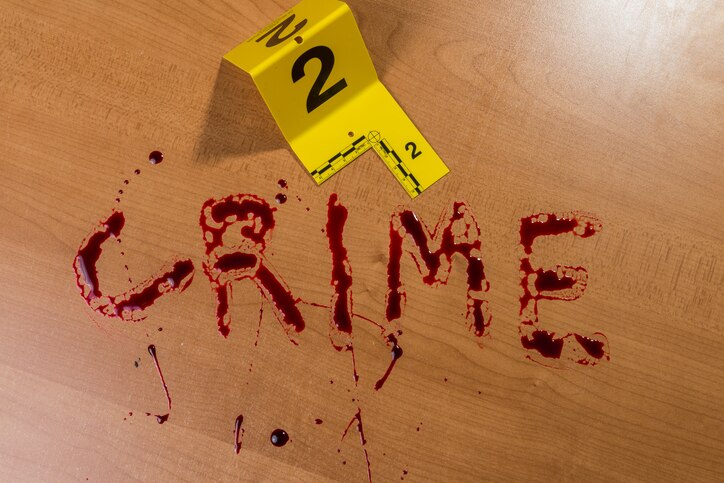Create a free profile to get unlimited access to exclusive videos, breaking news, sweepstakes, and more!
Wiping Down Death: A Crime Scene Cleaner Tells All
Did you know you may have to pay for it yourself?

After the tragedy of a violent crime or suicide, there are many mundane logistics that loved ones have to deal with: Police reports, funeral plans, and arrangements for the body.
But the unexpected end of life can also come with another unexpected burden — crime cleanup and cleanup costs.
“A lot of people have come to us and said, ‘I thought the police cleaned this up.’ That’s not the case,” Doug Baruchin, owner of Island Trauma Services (a crime cleanup business that serves the tri-state area of New York, New Jersey, and Connecticut), told Oxygen.com.
Island Trauma Services, which consists of a team of about 10 people, has been cleaning up crime scenes, murders, unintended deaths, suicides, and medical trauma for the last seven years. Baruchin used his expertise to answer every question you may have about crime scene clean up.
What does crime scene cleanup entail?
After a death, Baruchin said his team will first meet with the surviving family members.
“We have to access the scene, see what building materials are affected, what contents are affected, what the actual severity of the situation is,” he explained. The severity of the damage often depends on the situation. It’s not uncommon for the team to have to throw away mattresses and rip out hardwood floors.
“Sometimes bodily fluids can compromise the grooves in the hardwood floor,” he said. “We’ve had cases where it [blood] goes through the floor and to the apartment below.”
He said his team would need to remove anything that's directly affected by biohazard. Depending on the method of death, the size of the area that requires cleanup varies.
“For a shotgun suicide, for example, it’s basically a 360-degree spatter pattern of blood, tissue, brains, teeth, all the horrible stuff you can imagine,” Baruchin told us. “It’s our job to go in there and make this place safe for occupancy and to the best extent that we can like it never happened.”
How much does crime scene cleanup cost?
Any damage to a home caused by a homicide or suicide should be covered by homeowner’s insurance. But if you live in an apartment, it’s not covered at all. Cleanup can be quite costly, and can range from roughly $2,500 to $25,000.
The severity of the scene is going to drive the cost up, Baruchin noted.
“A shotgun suicide, or say, a week to 10-day unattended death or what we call a decomposition clean, will typically be much more than say, a handgun homicide, or something like that,” he said, adding that cost is typically driven by two things: labor and personal protective equipment. Suits, masks, and disposal costs all have to be covered. Items collected from a scene have to be incinerated and go along with state and federal regulations.
What if you want to clean it up on your own?
Bachurin wouldn’t recommend it.
“People sometimes try to clean this up themselves, which is just way too traumatic,” he told us. “It’s one thing for us to do it. We have a degree of separation, but it’s another thing if it’s somebody you knew or a friend.”
But if you really can’t afford it and it’s your only choice, he said it can be done. If you do it on your own, you do not have to follow any regulations.
“As an individual, you can do basically whatever you want,” Bachurin said. “You can clean it up and put it in the garbage can. We can’t do that as a company.”
He said doing a bit of research online will teach you all you need to know.
You’d need masks, gloves, and disposable coveralls. Make sure you use tools to help you find out where the blood is. If a blanket or bed is contaminated, throw it out. Non-coarse items can be cleaned. Wood floors can be pulled up and tossed.
How do the professionals clean up?
Bachurin said he doesn’t use luminol or blacklight to locate human fluids. Instead, his team uses a very strong hydrogen peroxide-based product which will foam up if there’s blood. He said his team also uses hospital-grade disinfectants, which should kill 99.9 percent of all pathogens in blood, including HIV and Hepatitis C.
What kind of person does this job?
The best candidates are people who can actually handle it, Bachurin said. He said several retired law enforcement personnel and a trained funeral director works for him. In addition to having a tough stomach, you also need a soft heart.
“You have to have a good stomach for it, a good deal of empathy and patience to deal with situations like this,” Bachurin said. “A lot of stuff that we get to do helps people through some really tough stuff." He added, "There are people with morbid curiosity and call up and say it looks like a cool job. Honestly, it’s anything but.”
Who should you contact if you need cleanup services?
Bachurin calls the crime scene cleanup industry a wild west. It’s not a huge industry, and it’s not regulated.
“There’s only a few certifications that you need to do it and only a few rules that you need to follow,” he said. “Every company does it a little bit differently. Some are a bit more reputable than others.”
The best advice he has is to call around for different quotes. Because the industry is unregulated, the prices can range considerably. Do some research to get a feel for the businesses in your area.
[Photo: Getty Images]














